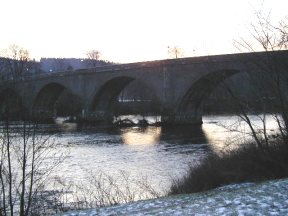

|
|||||||||
|
|
|
|
|
|
|
|
|
|
|
|
March 29th 1809 |


|
Dunkeld Bridge
Dunkeld Bridge General Wade was anxious to build a bridge as part of the military road from Fort George to Dunkeld but because of the hostility of the Duke of Atholl he gave up his plans to build the bridge at Dunkeld and constructed it instead at Aberfeldy. By the beginning of the 19th Century however, the advantages of a bridge became so obvious that an Act was passed to build a road bridge at Dunkeld and the necessary approach roads to it. Thomas Telford, the famous engineer, was commissioned to design it and it was opened on March 29th 1809. Unfortunately the grant provided by the government was by no means sufficient for all the expenses and the greatest part of the difference was met by the Duke of Atholl. He was granted the right of pontage to allow him to recoup his outlay and to recompense him for the loss of ferry dues. This imposition was not popular with the town and became even less so with the passage of time and the widespread belief that the Duke had more than recovered his initial outlay. There were periodic Toll Riots and the toll gates were lifted several times and thrown into the river. The situation became even worse when the Highland Railway was built. The station was on the other side of the river at Birnam so that passengers had to cross the bridge to travel by train. The coming of the railway resulted in a rapid expansion of the village of Birnam and after the Disruption of 1843, members of the Free Church found that they were paying dues for the privilege of attending their own church at Dunkeld. The resentment was articulated for much of the time by Alexander Robertson, a coal merchant of the town, popularly known as Dundonnachie who led a committee opposing the tolls, wrote pamphlets and was at one stage prosecuted on a charge of sedition. In 1869 the situation became so bad that a detachment of the Royal Highlanders was sent to Dunkeld to keep the peace. Finally, in 1879 the bridge was taken over by Perthshire County Council and the large white toll gate was removed for the last time. In the middle if the night, too, to prevent a public demonstration. |

